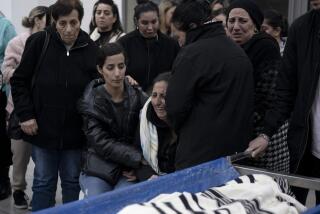Iraqi Official Promises Falloujans Compensation
- Share via
BAGHDAD — Iraqi officials announced plans Thursday for a massive compensation program that would rebuild thousands of homes damaged or destroyed during the recent battle for Fallouja -- which they said had killed more than 2,000 insurgents.
“All the people of Fallouja will be compensated by the government, and all those whose homes have sustained damage will have them repaired or rebuilt by the government,” Industry Minister Hachim Hassani said.
Although Hassani didn’t state specific figures, the bill for the reconstruction campaign is likely to be massive, as many parts of the city were practically destroyed.
Hassani, head of a joint ministerial committee overseeing reconstruction efforts in Al Anbar province, which includes Fallouja, said the government was preparing to care for as many as 300,000 Falloujans who had fled to neighboring towns before the U.S.-led attack.
Minister of State and de facto national security advisor Kasim Daoud defended the ferocity of the Fallouja assault as not only necessary, but in sync with the wishes of the Iraqi people.
“I doubt that there is any sympathy for these terrorists from ordinary Iraqi citizens,” he said. “We tried to deal with them in a peaceful manner, but they took it as a sign of weakness on the part of the Iraqi government. This is why we are forced to take a tough stance now.”
Daoud said 90% of Fallouja was under control. Cleanup operations were expected to eliminate pockets of resistance in the southeastern neighborhoods within “a few days,” said Daoud, who placed the most recent estimate of insurgents killed in Fallouja at 2,085. In addition, 1,300 suspected fighters were in detention.
As military operations wound down in Fallouja, the Iraqi government announced plans to meet with former high-ranking Baath Party members in exile.
Foreign Minister Hoshyar Zebari, returning from a recent international conference on Iraq in Sharm el Sheik, Egypt, said several Arab governments had asked him to bring exiled Baathists into the country’s fledgling and fragile political process.
Zebari didn’t give specifics on the timing of the meetings, or on who would be invited. But he said the talks would be held in Jordan and would exclude active participants in Iraq’s insurgency.
“We want to expand the participation of those Iraqis, as long as they denounce terror,” he said.
Leading Sunni politicians Thursday urged postponement of Jan. 30 parliamentary elections, Associated Press reported.
Adnan Pachachi, a former foreign minister and a member of the Iraqi National Council, said delaying the ballot at least three months would enable political leaders to persuade Sunni clerics and others to abandon calls for an election boycott.
Despite the Fallouja operation and the political discussions, violence continued.
In Samarra, 80 miles north of Baghdad, militants detonated a pair of car bombs, injuring six police officers and at least four other people.
Last month, U.S. and Iraqi forces wrested control of the city from insurgents in an assault that proved a precursor to the Fallouja campaign.
But Samarra remains an insurgent hotspot. Most recently, a series of clashes and bombings in early November killed 36 people, including 26 police officers.
The day’s first attack targeted a downtown youth center around 4:30 p.m.
Half an hour later, a suicide bomber detonated a car outside police headquarters. The building sustained some damage.
*
A Times special correspondent in Samarra contributed to this report.
More to Read
Sign up for Essential California
The most important California stories and recommendations in your inbox every morning.
You may occasionally receive promotional content from the Los Angeles Times.









